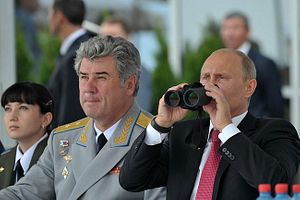Punitive Western sanctions over Russia’s actions in Crimea could lead to a massive increase in capital flight out of Russia. The World Bank has warned that capital flight could reach $150 billion in 2014, with $70 billion of that in the first quarter. According to Russian Central Bank data, in 2013, before Russia invaded Crimea, total annual capital outflows stood at $62.7 billion. In 2012, it was lower still at $54.6 billion.
While the World Bank’s $150 billion figure might seem high, one Russian presidential aide noted that capital flight could reach $100 billion in 2014. “I believe that the figure would be around $60-80 billion, but counting interventions [by Central Bank to reduce volatility], it could be some $100 billion,” Andrey Belousov said.
Earlier in March, Russian estimates placed the capital flight rate at around $50 billion per quarter. Alexei Kudrin, a member of the Presidium of the Russian president’s Economic Council and former Finance Minister, noted that should sanctions only affect the accounts of a limited number of individuals and companies, the resulting scenario would be “mild.”
“A key difference between the first and the second waves is the restrictions on currency operations carried out by our institutions in the international markets. This does not mean that operations will stop altogether and banks will have to work through correspondent accounts not at American or European banks but maybe in some other countries. We must understand that such measures were used in a number of instances. In this case, capital flight after the second wave [of sanctions] may reach $50 billion in the first and second quarters,” Kudrin added.
Capital flight can be hugely damaging to a national economy. It is defined as the mass exit of assets and money out of a country following a major economic event — in the Russian case, Western sanctions. It leads to a broad disappearance of wealth and results in the exchange rate of the effected country’s currency dropping dramatically. Capital flight is generally caused by wealthier citizens and investors moving their assets out of the country. As a result, poorer citizens are left bearing most of the economic damage after the currency loses most of its nominal value, resulting in a drop in the purchasing power of the national currency.
As a result, the economic outlook in Russia is rather poor for 2014. GDP growth is estimated to top out at just 0.6 percent owing to the sanctions implemented by the United States and the EU. Kudrin also noted, “This is what we are paying for having an independent foreign policy.”

































